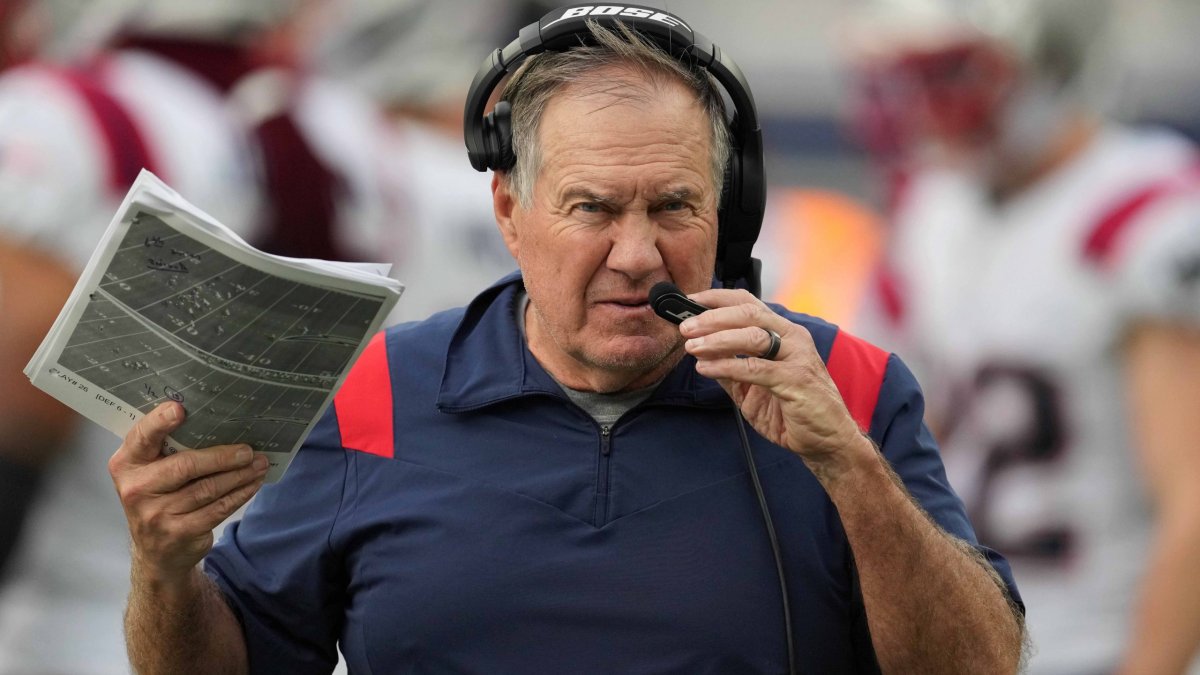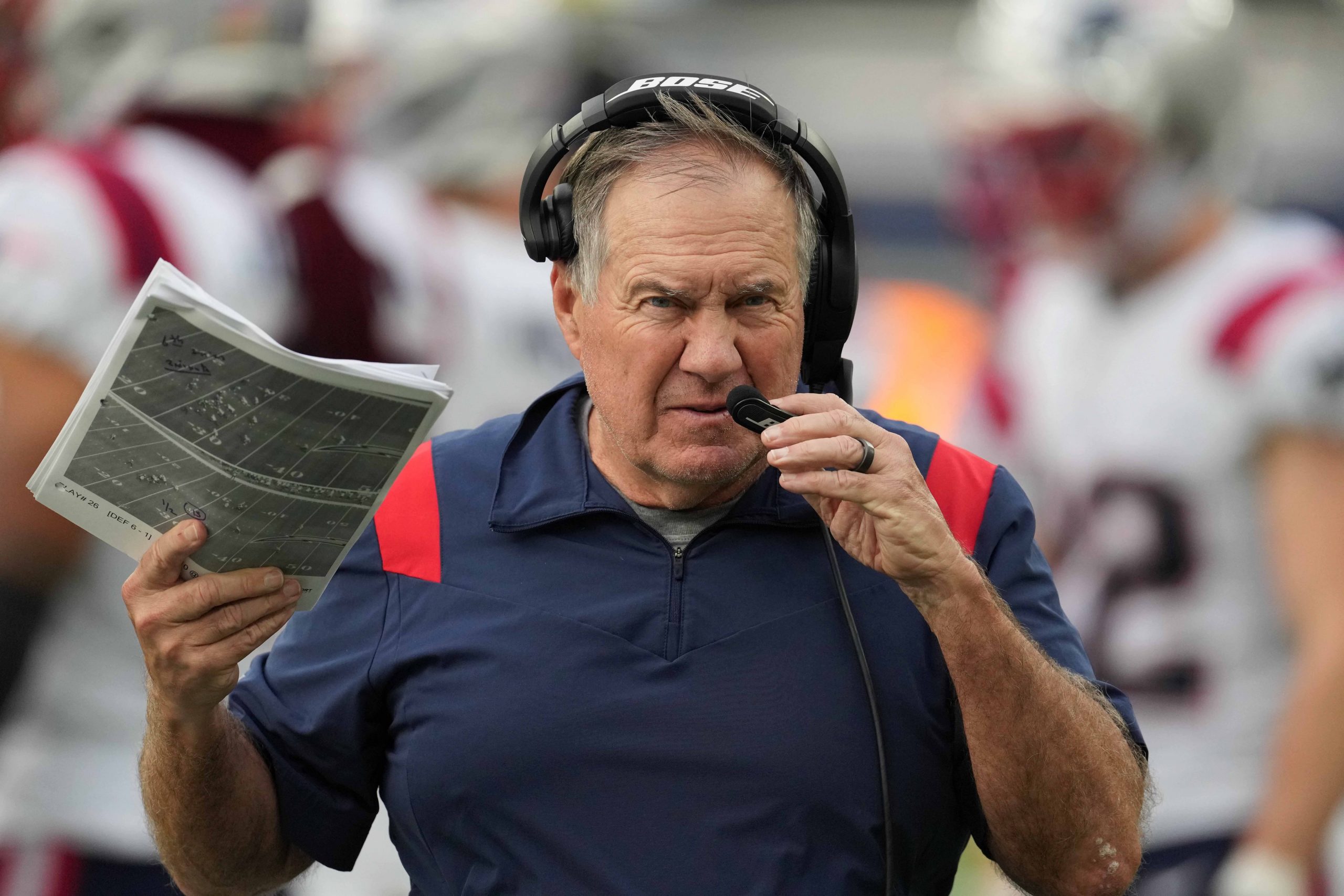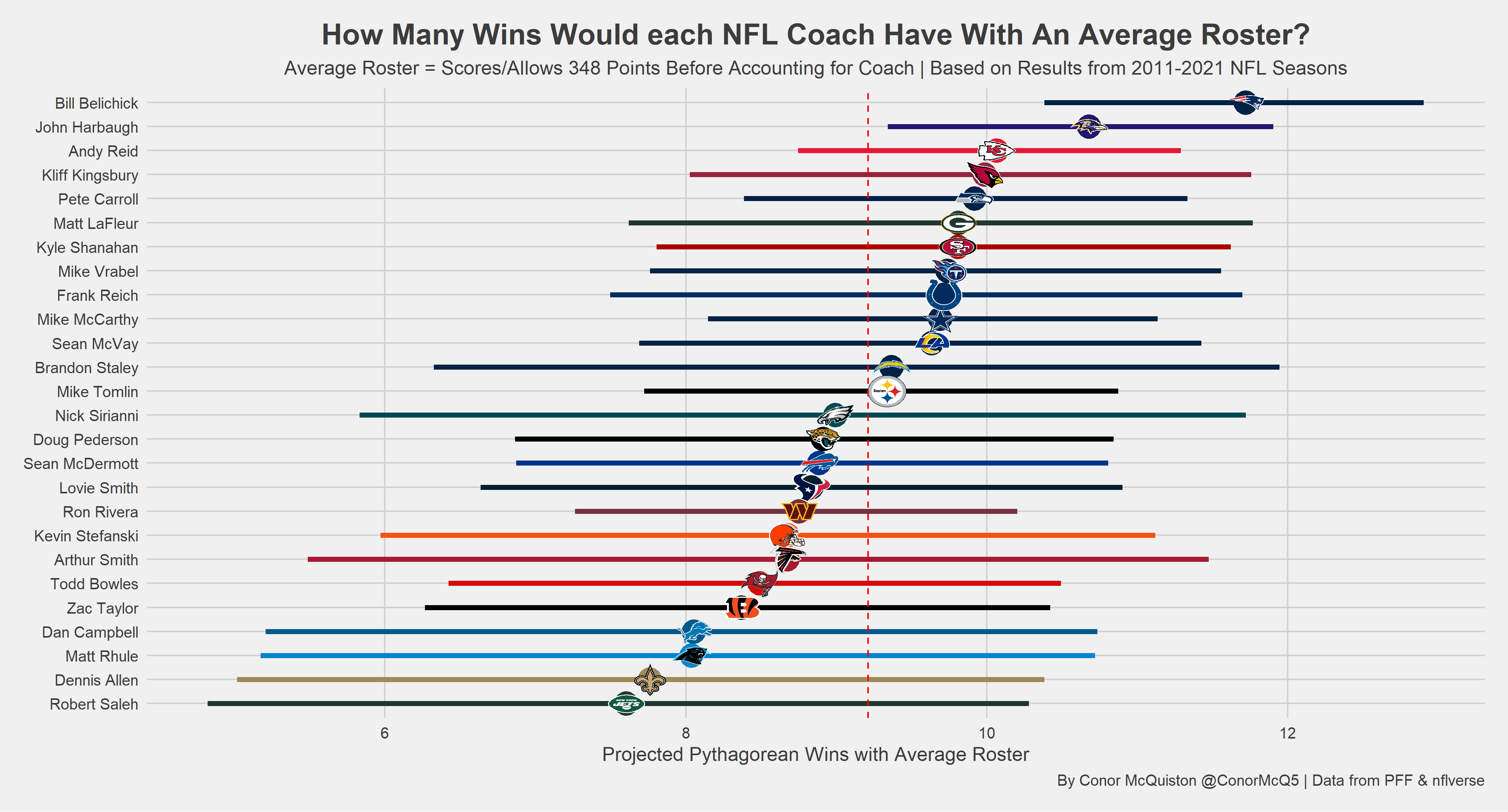
2022 NFL Head Coach Rankings: Bill Belichick, John Harbaugh and Andy Reid lead the way
Based on win total estimations with an average roster, the New England Patriots' Bill Belichick comes in at No. 1 in these head coach rankings ahead of the 2022 NFL season.
2022 NFL Head Coach Rankings: Bill Belichick, John Harbaugh and Andy Reid lead the way

Inglewood, California, USA; New England Patriots head coach Bill Belichick watches from the sidelines against the Los Angeles Chargers in the second half at SoFi Stadium. The Patriots defeated the Chargers 27-24. Mandatory Credit: Kirby Lee-USA TODAY Sports
By Conor McQuiston
Jun 6, 2022
Ranking NFL head coaches from an analytics perspective is a Sisyphean task for one simple reason: It's easy to win games with good players. Barring a calamity or an incredibly poor surrounding roster, most competent NFL coaches would still manage to be competitive for a playoff spot with Patrick Mahomes as their starting quarterback.
Using this idea in ranking the current NFL head coaches, we try to do two things: 1) properly account for a team’s talent level, and 2) predict something less volatile than wins. We do this by creating a multilevel model where the fixed effects are the salaries of each starter on both sides of the ball, including an indicator for if the player is a rookie, and the target is points scored or allowed in a season. A starter is defined as the player who took the most snaps at their position, filtering out key injuries. This was altered for several positions, such as the top three players being considered for wide receiver, cornerback, safety and linebacker, as well as the top two players qualifying for guard, tackle, edge and interior defender.
The coaches are the random effect, giving us an estimate for their contribution to points scored or allowed. We can then use Pythagorean wins to estimate how many games the coach would win with an average team, defined as a team scoring and allowing 348 points in a season. This was the average mark for all teams between the 2017-2021 seasons.
We will be considering only macro-level, on-field performance for these rankings, which are not opponent-adjusted. We will not be considering factors such as roster construction decisions or giving outsized weight to factors such as passing rate or fourth-down decisions.
It is important to note that using salaries as a percentage of the cap as an approximation for player talent creates issues where a particular starter is under- or overpaid. This is particularly relevant for quarterbacks who are still on their rookie contracts.
NOTE: This ranking does not consider results from prior to 2011 and does not include first-time head coaches, since success as a coordinator does not necessarily translate to success as a head coach. Thus, Josh McDaniels, Brian Daboll, Matt Eberflus, Nathaniel Hackett, Mike McDaniel and Kevin O'Connell are not included.

TIER 1: HALL OF FAME COACHES
These coaches are set to one day admire their busts in Canton. All have enjoyed success for at least a decade, won at least one Super Bowl and played in multiple conference championships. There is room for debate as to their exact ordering and the exact approximations of their effects, but their accomplishments and longevity speak for themselves.1. BILL BELICHICK, NEW ENGLAND PATRIOTS (11.7-5.3 RECORD WITH AVERAGE ROSTER)
- Offensive Rank: 1/26 (+121 points scored a season)
- Defensive Rank: 1/26 (-32 points allowed a season)
2. JOHN HARBAUGH, BALTIMORE RAVENS (10.7-6.3 RECORD WITH AVERAGE ROSTER)
- Offensive Rank: 2/26 (+90 points scored a season)
- Defensive Rank: 4/26 (-11 points allowed a season)
3. ANDY REID, KANSAS CITY CHIEFS (10.1-6.9 RECORD WITH AVERAGE ROSTER)
- Offensive Rank: 4/26 (+77 points scored a season)
- Defensive Rank: 17/26 (+5 points allowed a season)
TIER 2: GOOD COACHES
Many of these coaches are either rising stars or have had comfortable amounts of success in their careers at the helm. In any given year, the teams they coach will likely be in the playoffs, although they generally either struggle on one side of the ball or simply haven't sustained their success over time.4. KLIFF KINGSBURY, ARIZONA CARDINALS (10.0 – 7.0 RECORD WITH AVERAGE ROSTER)
- Offensive Rank: 3/26 (+81 points scored a season)
- Defensive Rank: 23/26 (+12 points allowed a season)
5. PETE CARROLL, SEATTLE SEAHAWKS (9.9 – 7.1 RECORD WITH AVERAGE ROSTER)
- Offensive Rank: 12/26 (+42 points scored a season)
- Defensive Rank: 3/26 (-18 points allowed a season)
6. MATT LAFLEUR, GREEN BAY PACKERS (9.8 – 7.2 RECORD WITH AVERAGE ROSTER)
- Offensive Rank: 8/26 (+55 points scored a season)
- Defensive Rank: 9/26 (-3 points allowed a season)
7. KYLE SHANAHAN, SAN FRANCISCO 49ERS (9.8 – 7.2 RECORD WITH AVERAGE ROSTER)
- Offensive Rank: 6/26 (+64 points scored a season)
- Defensive Rank: 16/26 (+5 points allowed a season)
8. MIKE VRABEL, TENNESSEE TITANS (9.7 – 7.3 RECORD WITH AVERAGE ROSTER)
- Offensive Rank: 7/26 (+56 points scored a season)
- Defensive Rank: 12/26 (+0.9 points scored a season)
9. FRANK REICH, INDIANAPOLIS COLTS (9.7 – 7.3 RECORD WITH AVERAGE ROSTER)
- Offensive Rank: 10/26 (+49 points scored a season)
- Defensive Rank: 8/26 (-3.9 points allowed a season)
10. MIKE MCCARTHY, DALLAS COWBOYS (9.7 – 7.3 RECORD WITH AVERAGE ROSTER)
- Offensive Rank: 5/26 (+68 points scored a season)
- Defensive Rank: 25/26 (+15 points scored a season)
11. SEAN MCVAY, LOS ANGELES RAMS (9.6 – 7.4 RECORD WITH AVERAGE ROSTER)
- Offensive Rank: 9/26 (+55 points scored a season)
- Defensive Rank: 15/26 (+4.3 points scored a season)
12. BRANDON STALEY, LOS ANGELES CHARGERS (9.4 – 7.6 RECORD WITH AVERAGE ROSTER)
- Offensive Rank: 11/26 (+46 points scored a season)
- Defensive Rank: 20/26 (+8 points scored a season)
13. MIKE TOMLIN, PITTSBURGH STEELERS (9.3 – 7.7 RECORD WITH AVERAGE ROSTER)
- Offensive Rank: 13/26 (+25 points scored a season)
- Defensive Rank: 5/26 (-10 points allowed a season)
TIER 3: AVERAGE COACHES
Some of these coaches have seen their fair share of postseason success, and Doug Pederson has won a Super Bowl. Despite this, they can still falter and fail to see above-average results on either side of the ball, which eventually shows up in the win column. This group is also saturated with early-tenure coaches who have a wide range of outcomes looking into the future.14. NICK SIRIANNI, PHILADELPHIA EAGLES (9.0 – 8.0 RECORD WITH AVERAGE ROSTER)
- Offensive Rank: 14/26 (+24 points scored a season)
- Defensive Rank: 13/26 (+3 points allowed a season)
15. DOUG PEDERSON, JACKSONVILLE JAGUARS (8.9 – 8.1 RECORD WITH AVERAGE ROSTER)
- Offensive Rank: 17/26 (+16 points scored a season)
- Defensive Rank: 10/26 (-1 points allowed a season)
16. SEAN MCDERMOTT, BUFFALO BILLS (8.9 – 8.1 RECORD WITH AVERAGE ROSTER)
- Offensive Rank: 20/26 (+12 points scored a season)
- Defensive Rank: 7/26 (-4 points scored a season)
17. LOVIE SMITH, HOUSTON TEXANS (8.8 – 8.2 RECORD WITH AVERAGE ROSTER)
- Offensive Rank: 18/26 (+15 points scored a season)
- Defensive Rank: 11/26 (+0.7 points allowed a season)
18. RON RIVERA, WASHINGTON Commodes (8.8 – 8.2 RECORD WITH AVERAGE ROSTER)
- Offensive Rank: 16/26 (+18 points scored a season)
- Defensive Rank: 19/26 (+7 points allowed a season)
19. KEVIN STEFANSKI, CLEVELAND BROWNS (8.7 – 8.3 RECORD WITH AVERAGE ROSTER)
- Offensive Rank: 15/26 (+18 points scored a season)
- Defensive Rank: 21/26 (+10 points allowed a season)
20. ARTHUR SMITH, ATLANTA FALCONS (8.7 – 8.3 RECORD WITH AVERAGE ROSTER)
- Offensive Rank: 19/26 (+13 points scored a season)
- Defensive Rank: 18/26 (+6 points allowed a season)
TIER 4: ROOM FOR IMPROVEMENT
With a single exception, these coaches have not enjoyed much success in their careers. Most of these coaches are very early in their careers, though, and do have time to turn it around. Regardless, for the most part, they have struggled immensely on at least one side of the ball.21. TODD BOWLES, TAMPA BAY BUCCANEERS (8.5 – 8.5 RECORD WITH AVERAGE ROSTER)
- Offensive Rank: 22/26 (-7 points scored a season)
- Defensive Rank: 6/26 (-7 points allowed a season)
22. ZAC TAYLOR, CINCINNATI BENGALS (8.4 – 8.6 RECORD WITH AVERAGE ROSTER)
- Offensive Rank: 21/26 (+7 points scored a season)
- Defensive Rank: 24/26 (+13 points allowed a season)
23. DAN CAMPBELL, DETROIT LIONS (8.1 – 8.9 RECORD WITH AVERAGE ROSTER)
- Offensive Rank: 23/26 (-8 points scored a season)
- Defensive Rank: 22/26 (+10 points scored a season)
24. MATT RHULE, CAROLINA PANTHERS (8.0 – 9.0 RECORD WITH AVERAGE ROSTER)
- Offensive Rank: 24/26 (-15 points scored a season)
- Defensive Rank: 14/26 (+4 points allowed a season)
25. DENNIS ALLEN, NEW ORLEANS SAINTS (7.8 – 9.2 RECORD WITH AVERAGE ROSTER)
- Offensive Rank: 26/26 (-48 points scored a season)
- Defensive Rank: 2/26 (-21 points allowed a season)
26. ROBERT SALEH, NEW YORK JETS (7.6 – 9.4 RECORD WITH AVERAGE ROSTER)
- Offensive Rank: 25/26 (-18 points scored a season)
- Defensive Rank: 26/26 (+18 points allowed a season)


